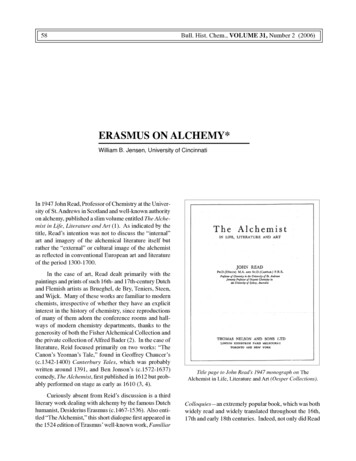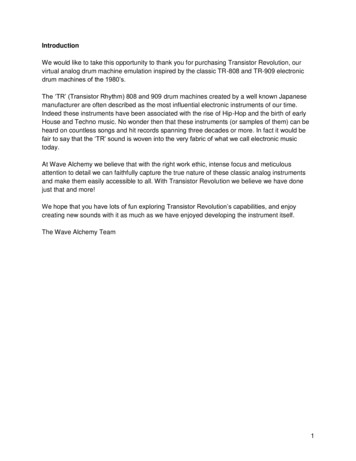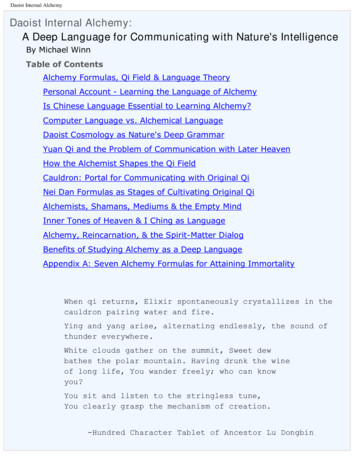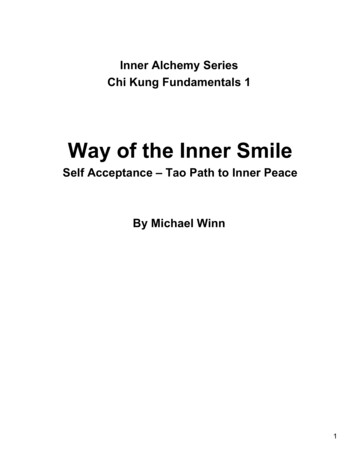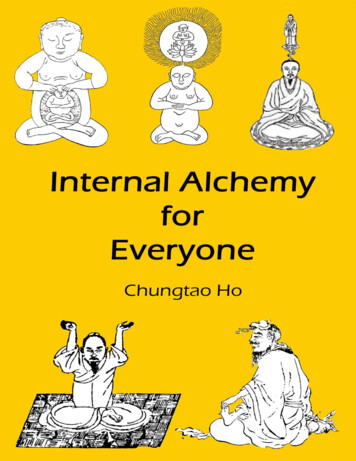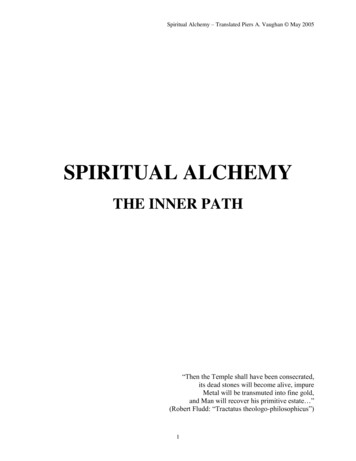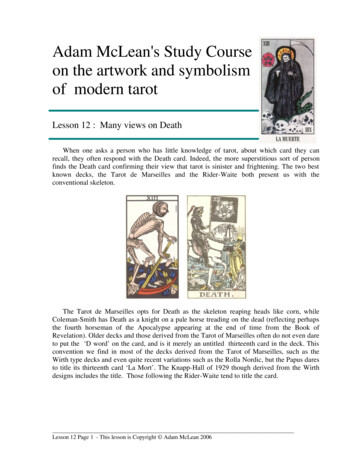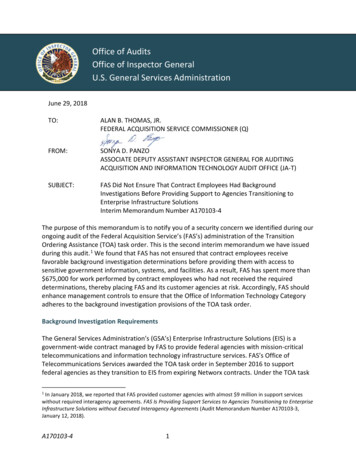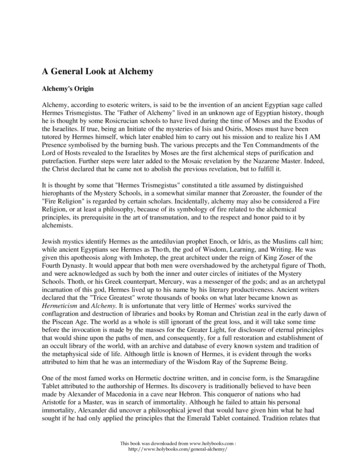
Transcription
A General Look at AlchemyAlchemy's OriginAlchemy, according to esoteric writers, is said to be the invention of an ancient Egyptian sage calledHermes Trismegistus. The "Father of Alchemy" lived in an unknown age of Egyptian history, thoughhe is thought by some Rosicrucian schools to have lived during the time of Moses and the Exodus ofthe Israelites. If true, being an Initiate of the mysteries of Isis and Osiris, Moses must have beentutored by Hermes himself, which later enabled him to carry out his mission and to realize his I AMPresence symbolised by the burning bush. The various precepts and the Ten Commandments of theLord of Hosts revealed to the Israelites by Moses are the first alchemical steps of purification andputrefaction. Further steps were later added to the Mosaic revelation by the Nazarene Master. Indeed,the Christ declared that he came not to abolish the previous revelation, but to fulfill it.It is thought by some that "Hermes Trismegistus" constituted a title assumed by distinguishedhierophants of the Mystery Schools, in a somewhat similar manner that Zoroaster, the founder of the"Fire Religion" is regarded by certain scholars. Incidentally, alchemy may also be considered a FireReligion, or at least a philosophy, because of its symbology of fire related to the alchemicalprinciples, its prerequisite in the art of transmutation, and to the respect and honor paid to it byalchemists.Jewish mystics identify Hermes as the antediluvian prophet Enoch, or Idris, as the Muslims call him;while ancient Egyptians see Hermes as Tho th, the god of Wisdom, Learning, and Writing. He wasgiven this apotheosis along with Imhotep, the great architect under the reign of King Zoser of theFourth Dynasty. It would appear that both men were overshadowed by the archetypal figure of Thoth,and were acknowledged as such by both the inner and outer circles of initiates of the MysterySchools. Thoth, or his Greek counterpart, Mercury, was a messenger of the gods; and as an archetypalincarnation of this god, Hermes lived up to his name by his literary productiveness. Ancient writersdeclared that the "Trice Greatest" wrote thousands of books on what later became known asHermeticism and Alchemy. It is unfortunate that very little of Hermes' works survived theconflagration and destruction of libraries and books by Roman and Christian zeal in the early dawn ofthe Piscean Age. The world as a whole is still ignorant of the great loss, and it will take some timebefore the invocation is made by the masses for the Greater Light, for disclosure of eternal principlesthat would shine upon the paths of men, and consequently, for a full restoration and establishment ofan occult library of the world, with an archive and database of every known system and tradition ofthe metaphysical side of life. Although little is known of Hermes, it is evident through the worksattributed to him that he was an intermediary of the Wisdom Ray of the Supreme Being.One of the most famed works on Hermetic doctrine written, and in concise form, is the SmaragdineTablet attributed to the authorship of Hermes. Its discovery is traditionally believed to have beenmade by Alexander of Macedonia in a cave near Hebron. This conqueror of nations who hadAristotle for a Master, was in search of immortality. Although he failed to attain his personalimmortality, Alexander did uncover a philosophical jewel that would have given him what he hadsought if he had only applied the principles that the Emerald Tablet contained. Tradition relates thatThis book was downloaded from www.holybooks.com :http://www.holybooks.com/general-alchemy/
the Tablet was wrought out of artificial emerald, as a result of transmutation, with the Hermeticdoctrine embossed on it.Alchemy, as a philosophy and an art in the Western hemisphere in the past two millenia, existedconcurrently in other ancient cultures and civilizations-- it was practiced intensely by Hindu Yogisand Taoists, in India and China. This parallel growth is probably the result of the Great WhiteBrotherhood's periodic presentation of a spiritual method designed for the development of certaintypes of temperaments and belief- framework of those aspirants belonging to a certain era and stage ofmankind's collective evolution.Based on this parallel growth of alchemy in the Orient and the regions of the Fertile Crescentsuggested to some Esoteric historians that alchemy may have had a common origin in that sunkencontinent Atlan, or Atlantis, as it is more generally known. Esoteric Tradition declares that a handfulof the Atlantean Root Race survived the submergence of the land and transmigrated to Egypt, China,and the Americas. It is reasonable to assume that they brought with them their sciences, art, andculture, which influenced the inhabitants indigenous to the regions where they settled. This wouldexplain the similarities in the traditions and beliefs of native cultures to be found both East and West.Principles of Alchemy are the principles that Nature herself works with, and thus alchemy,scientifically, existed in the inner planes long before it was brought down to the earth plane byMaster teachers. A study of Nature's mysteries would reveal to the discerning student that the higherIntelligences, the Elohim, and the Great Architect of the Universe utilized alchemical principles toprecipitate the starry bodies out of Chaos, out of Cosmic Root Substance or "Sunyata," as termed bythe Buddhist. Qabalists believe that Adam was taught by the angels in Paradise the art oftransmutation, to prepare him for his "Fall" and his climb back toward his Monad, toward godhood-his involution and evolution from a Divine Consciousness to Divine Self-Consciousness.There is no general concurrence among scholars as to the origin of the word "alchemy." Theconsensus is that the word is derived from the word "Khem," the ancient name for Egypt, added tothe Arabic article "al," meaning "the," thus forming the word "al-Khemy." However, Sir WallisBudge is of the opinion that alchemy comes from the Egyptian word "khemein," meaning the "blackpowder" or "ore" which is presumed to be an ingredient in alchemy. No matter where it secured itsname, the word "alchemy," it would seem, first came into prominence in the Mystery Schools inAlexandria.Purpose of AlchemyBut just what is alchemy, and what role does it play in the promotion of the welfare of mankind? Ifalchemy has any true value, it must be based upon eternal values, upon the things that supportHeaven's purposes; in other words, upon God's plan of humankind's becoming into the true Elohimicimage of the divine. If alchemy simply had an earthly objective, masterminds of the Ages would nothave conc erned themselves with it. It would have been considered as something so trivial, sotransient, as to distract Man from the real work of extricating himself, specifically, from his bondageto the carnal self, the kama manas, or animal soul; and generally, from samsara. Greed was never theimpulse that prompted the invention of alchemy. It was, is, and always will be Man's desire for Truthand enlightenment of his true nature and estate that motivates him to seek through every channel andavenue for that certain something that he subconsciously feels he had "lost" and which is his to reacquire--call it "the Lost Word," "the Philosopher's Stone," or "the Holy Grail," it matters not.Alchemy teaches Man the principles of regeneration and resurrection, laws of creation andtransmutation; laws that would assist Man to regain his former estate lost in "the Fall." This "Fall"This book was downloaded from www.holybooks.com :http://www.holybooks.com/general-alchemy/
from Paradise symbolically represents involution of the human life wave into physical matter. Theway back to the Throne of God is scientifically called "evolution," and the acceleration of the latter isthe art of the hermetic gnosis. This Path of Return is esoterically and graphically symbolised byJacob's Ladder, and the paths of the Qaballistic "Tree of Life."The drama of Jesus' life is an alchemical allegory of the steps of regeneration and ascension to the IAM Presence within, the "Father who art in Heaven." Orthodox Christianity does not recognize or isunaware of this vital truth, and because of the lack of mystical insight among most members of itspriesthood coupled with the absence of esoteric truths in the doctrines and dogmas of the Church, theaverage Christian is ignorant and unaware of the true message of Christianity--of the Light, the Christsubstance, and the true saving blood that Christ introduced to humankind. Esoteric Christianity isfundamentally an alchemical science and religion; its promulgator was a Master Alchemist--beingtaught in the initiatory halls of the Mystery Schools. It is related in the Gospels how the Mastertransmuted water into wine, multiplied loaves and fishes, and walked on water--all of which weremanifestations of the applied principles of alchemy, the Hermetic philosophy--or perhaps theseevents were all allegories conveying some spiritual teaching.Alchemy is defined as an art of transmutation and precipitation--the changing of base metals intogold. The work of alchemical transmutation is designated as "the Labor of the Sun." This "Eye of Ra"symbolically represents the perfection with which Nature is gradually unfolding in her creations. Atthe physical level the Sun of Perfection is represented by gold. Alchemy is the science and art whichhasten the creations of Nature to attain perfection at their own respective level. Gold is the perfectionattain by metals and minerals. Minerals, however, are also following another line of perfection--thatof its ability to sustain life and consciousness. And Man, the acme of organic life, is evolving to thestate where he acquires perfection in Divine Self-Awareness.From the above it can be summarized that alchemy is the art of raising vibrations of an object in orderto hasten its development or evolution into a higher expression or state. The result is perfection of theobject of the transmutation.Alchemy's Transmission to ChristendomAlexandria was the philosophical capital of Egypt, and perhaps of the whole civilized worlds in theearly centuries of Christianity. Gnosticism, Neoplatonism, Alchemy and Hermeticism floweredabundantly; these philosophies are intrinsically related, and to comprehend the Royal Art fully, thestudent of alchemy is advised by Master teachers to be familiar with their doctrines. Alexandria'sGolden Age of occult philosophy did not last long, for the reptilian mind of the fallen angels hadseized control of the rising new religion of Christianity (no offence to our Christian brothers andsisters). The philosophical sons and daughters of Hermes were persecuted and murdered brutally byChristian fundamentalists and fanatics. Fear and hatred were aroused among the masses and theousting of the so-called pagan religions from the land ensued. One sad event was the cruelassassination of Hypathia, an illustrious daughter of the Mysteries--the Widow Isis, and propounderof Neoplatonism. She hardly had a philosophical equal during her day, and this caused the envy andjealousy of a certain priest who contrived her murder.During the decline of the Roman Empire, the Secret Doctrine, or the Ancient Wisdom were passed onto the guardianship of the Arabian and Persian mystics. The tenets of occult wisdom were laterincorporated into the Muslim faith with its higher aspects promulgated secretly in the traditional oralmanner in certain sects, Orders, and mystical groups such as the Sufi and Dervish Orders, and amongthe community of Druzes in Lebanon and Syria.This book was downloaded from www.holybooks.com :http://www.holybooks.com/general-alchemy/
In the 8th to the 11th centuries A.D., in the era of the golden period of alchemic-Islamic culture, wehear of eminent names in the field of the Royal Art, such as al-Farabi, Rhazes, Geber and Avicenna.These men studied the mystery teachings and occult wisdom of the Egyptian and Greek schools.They were most notably influenced by Hermetic, Alchemic and Neoplatonic ideas, and theknowledge that they acquired was synthesized with Islamic and Sufic doctrines. The Sufi adeptsproduced one of the most beautiful symbols of spiritual unfoldment and progression: the rose. Itssymbolism is comparable to the lotus adopted by Hindu mystics.The Knights Templer was an important link between both East and West, between Islamic cultureand the world of Christendom. The alchemical doctrine was passed on by the Sufi adepts to these"Knights of the Holy Sepulchre," as the Templers were originally called. Even the mythical ChristianRosencruez of Rosicrucianism is said to have acquired his occult knowledge from the Sufi Mastersand adepts in Arabia.After the days of the disbandment of the Templer Order by Philip the Fair of France, and the deathsentence of their last Grand Master, Jacques de Molay in 1314, the surviving Knights sought refugein various countries; and in England some of them founded an alchemical Order which later becameknown as the "Elder Brothers of the Rose Cross." It is said that this Order comprised 33 members andthat this group exists even to this very day in our computer age.When the believers of Allah invaded and settled in Iberia, they brought with them the SecretTeachings. Colleges were established that had mysticism, metaphysics, and alchemy in thecurriculum. With the establishment of the various schools, the Ancient Wisdom finally took definiteroot in European soil, and it spread gradually throughout the other regions of the Continent. Thisexpansion was no doubt the result of the efforts put forth by the spiritual hierarchy of this planet.Man's evolution is divided into certain steps, stages, and cycles, and these have "time-tables" orschedules associated with them. It was expedient that the Flames of Truth and Freedom be given tothe custodian of the Islamic world if it were not t
A General Look at Alchemy Alchemy's Origin Alchemy, according to esoteric writers, is said to be the invention of an ancient Egyptian sage called Hermes Trismegistus. The "Father of Alchemy" lived in an unknown age of Egyptian history, though he is thought by some Rosicrucian schools to have lived during the time of Moses and the Exodus of the Israelites. If true, being an Initiate of the .

